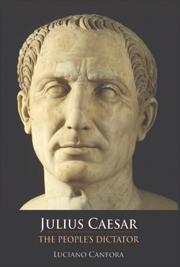Book contents
- Frontmatter
- Contents
- Translators' Note
- Acknowledgements
- Foreword
- PART I FROM SULLA TO CATILINE
- PART II FROM THE TRIUMVIRATE TO THE CONQUEST OF GAUL
- PART III THE LONG CIVIL WAR
- PART IV FROM THE CONSPIRACY TO THE TRIUMPH OF CAESARISM
- 29 Inklings of Conspiracy
- 30 ‘Iure caesus’
- 31 The Lupercalia Drama
- 32 The Dictatorship
- 33 Epicureans in Revolt?
- 34 The Hetairia of Cassius and the Recruitment of Brutus
- 35 A Conspirator's Realism: Cassius Settles for the Second Rank
- 36 Some Unexpected Refusals
- 37 Cicero – an Organiser of the Conspiracy?
- 38 The Serious Mistake of Dismissing the Escort
- 39 The Dynamics of the ‘Tyrannicide’
- 40 ‘Where's Antony?’
- 41 Caesar's Body: How to Turn Victory into Defeat
- 42 The Wind
- Chronology
- Bibliography
- Index
38 - The Serious Mistake of Dismissing the Escort
from PART IV - FROM THE CONSPIRACY TO THE TRIUMPH OF CAESARISM
Published online by Cambridge University Press: 05 August 2013
- Frontmatter
- Contents
- Translators' Note
- Acknowledgements
- Foreword
- PART I FROM SULLA TO CATILINE
- PART II FROM THE TRIUMVIRATE TO THE CONQUEST OF GAUL
- PART III THE LONG CIVIL WAR
- PART IV FROM THE CONSPIRACY TO THE TRIUMPH OF CAESARISM
- 29 Inklings of Conspiracy
- 30 ‘Iure caesus’
- 31 The Lupercalia Drama
- 32 The Dictatorship
- 33 Epicureans in Revolt?
- 34 The Hetairia of Cassius and the Recruitment of Brutus
- 35 A Conspirator's Realism: Cassius Settles for the Second Rank
- 36 Some Unexpected Refusals
- 37 Cicero – an Organiser of the Conspiracy?
- 38 The Serious Mistake of Dismissing the Escort
- 39 The Dynamics of the ‘Tyrannicide’
- 40 ‘Where's Antony?’
- 41 Caesar's Body: How to Turn Victory into Defeat
- 42 The Wind
- Chronology
- Bibliography
- Index
Summary
Suetonius, who is well informed about reports of warnings reaching Caesar before the conspiracy, wonders whether Caesar actually wanted to die, given that exhaustion had led to physical decline – a question which, he says, has already been explored by others. He paid no attention, it is said, to omens or ‘the reports of his friends’. Suetonius also records the view that Caesar felt safer after the senators had sworn to protect him, and therefore made the mistake – which made possible his murder – of dismissing his bodyguard. A third opinion, which Suetonius duly records, is actually very close to the theory of those who said ‘he wanted to die’: this view held that he preferred to confront those perils, once and for all, rather than live constantly in fear of them. It is probable that each one of these suggestions captures part of the truth and helps to understand Caesar's baffling decision to dismiss his armed escort.
But the most important evidence comes from Caesar himself, reported again by Suetonius in the same chapter. Caesar used to say, and Suetonius records his words verbatim, that:
it was not so much in his own interest as in that of his country that he remained alive; he had long since had his fill of power and glory; but if aught befell him, the commonwealth would have no peace, but would be plunged in civil strife under much worse conditions.
- Type
- Chapter
- Information
- Julius CaesarThe People's Dictator, pp. 322 - 324Publisher: Edinburgh University PressPrint publication year: 2007

